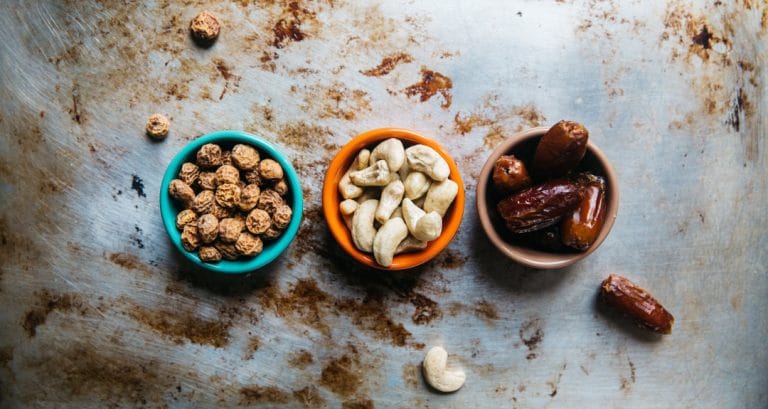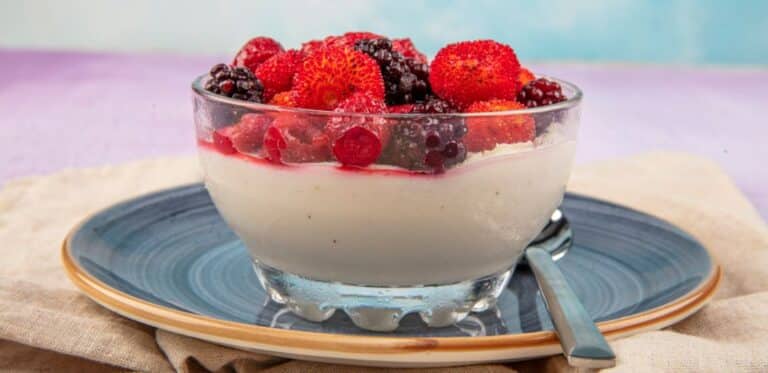Working Out in a Fasted State: Worthwhile or Not?
It’s an ongoing debate in the fitness community: is it better to work out on an empty stomach or eat a snack before hitting the gym?
Whether your goal is weight loss or muscle building, you’re sure to find dozens of articles that encourage each strategy. So, is working out in a fasted state harmful, helpful, or somewhere in between?
Here we’ll talk about how your body gets fuel in fed versus fasted conditions and current recommendations about working out in a fasted state.
Food as Fuel: How the Body Gets Energy
Your body uses calories from food and drinks as fuel to provide energy and power for everyday activities.
These calories fall into carbohydrates, protein, fat, and alcohol.
The first three are nutritious and helpful to fuel your body throughout the day and night. Calories from alcohol provide no nutritional benefit.
At Mealtime
Carbohydrate is the preferred fuel source for our bodies when all else is equal. Even though it is one of the less energy-dense nutrients at just four calories per gram, carbs are easily digested and utilized for quick energy.
However, the body can also process and use protein and fat as energy when carbohydrates are in short supply.
Fat is the most energy-dense nutrient at nine calories per gram and the preferred energy source for people who follow very low-carbohydrate, high-fat diets like Keto or Atkins.
Between Meals
Thankfully, our bodies are also designed to keep our cells fueled and happy between meals! This allows us to go about our daily lives without needing to stop and “top up” our stomachs every couple of hours.
Glycogen is the first and most accessible energy source when circulating glucose runs low. Glycogen is a carbohydrate stored in your liver and, to a lesser extent, in your muscles.
It provides quick energy since it’s easily broken down into glucose. We draw on glycogen in the morning when we haven’t eaten for many hours overnight and in-between meals to keep blood sugar stable.
However, individuals who follow very low-carb diets don’t maintain large glycogen stores since this backup energy is formed by storing excess carbohydrates from food.
Instead, these people’s livers produce ketone bodies to fuel their cells between meals.
Ketone bodies are derived from fatty acids, so proponents of these diets say that this alternative energy pathway helps eliminate more fat. One disadvantage of using fatty acids for energy is that they require oxygen to be broken down.
As a result, they aren’t a very efficient fuel source during anaerobic activities like sprints or heavy weight lifting.
Activity and Energy Needs

When you move, you need more fuel than when you’re sedentary. It’s just like a car: when you drive all day, it needs more gas than when it remains parked for hours at a time.
We burn more calories during and after exercise because our bodies need extra energy to power increased activity and enable muscle repair.
While you may not worry too much about which fuel source your body uses during hours of sitting in the office or classroom, fuel makes a more significant difference when you’re worried about performance and endurance in sports.
This is where the “to eat or not to eat” debate comes into play. Is it better to work out before or after breakfast? Should you have a quick snack before hitting the gym after work?
When – and what – you eat primarily determines which energy source your body will use for fuel.
Working Out in a Fasted State: The Benefits
If you’re an early riser, working out in the morning may be the most productive time for you to fit in a sweat session.
Or, if you’re running from work to an evening class, you may not have time to sit down for a healthy snack. So, do you need to eat beforehand – even if it’s super early in the morning or just as you walk into the gym?
Actually, it may be beneficial to hold off until after your workout.
Quick note: The term “fasted” can either refer to not eating at all or to not eating any carbohydrates. The benefits below would apply to either use of the term.
More Fat Burn
Some research indicates that you should break a sweat before breakfast (or after fasting) to maximize fat loss.
The idea is that if you exercise after an extended fast (such as overnight or at the end of your fast if you’re intermittent fasting), your body is already low on glucose and drawing on glycogen for energy.
So, when you start exercising, and your energy needs increase, you will more quickly deplete your glycogen stores and switch to burning fatty acids for energy.
Proponents of working out a fasted state say that this accelerated switch from glycogen to fatty acids as the main source of fuel means you’ll lose more fat.
One 2017 study supports this hypothesis. Subjects showed increased expression of genes that promote metabolic health (including blood sugar regulation) when they fasted before walking compared to after eating breakfast.
While this study was very small, and the researchers found no significant differences in short-term fat burning, the potential effect of fed vs. fasted exercise on metabolic hormones provides thought-provoking support for those who say fasted workouts improve long-term health.
Diversified Fuel Efficiency
Some sources also note that if you consistently work out after fasting (e.g., before breakfast or without an afternoon snack), you may be able to improve your body’s ability to utilize glycogen and fatty acids as complementary energy sources.
Still, biologically, fat is most effectively utilized when you’re exercising at about 60% of your max, while carbohydrates are the preferred energy source for any higher-intensity workouts.
This is because glucose is more quickly and anaerobically available.
Eating Before a Workout: The Benefits
We can all agree that exercising after a big meal leads to nothing but misery and sluggishness, but is it smart to grab a small snack before breaking a sweat?
Some experts respond with a resounding yes. Here are a few of the advantages of eating before your workout!
A Blood Glucose Boost
Eating 30 to 120 minutes before a workout boosts your blood glucose so that you’re not immediately reliant on glycogen to carry you through the workout.
Glucose (blood sugar) is even more readily-available than glycogen and acts as your body’s preferred energy source.
So, eating (or drinking) a small, carbohydrate-rich snack before exercising tops up your body’s energy stores and gives it the fuel it needs to perform!
This pre-workout snack is especially important for people with diabetes, or other conditions that affect blood glucose stability.
If you already have trouble regulating blood sugar, it’s even more likely that fasted workouts will make you feel dizzy, lightheaded, nauseous, or generally unwell. Better to grab a quick snack!
Better Performance in High-Intensity Sports
If you’re hoping for gains in strength, speed, or performance, working out on an empty stomach probably isn’t the best strategy for you.
Since fatty acids need oxygen to be broken down, they’re not as helpful when you need quick energy for intense exercises (like sprinting, HIIT, or powerlifting).
As a result, relying on already-depleted glycogen stores for energy can hurt your performance.
A healthy, fed adult stores enough glycogen for about 90 minutes of exercise.
However, if your stores are already being eaten away to keep your blood sugar up during a fast, you may be lacking in that extra burst of energy to finish the set, sprint, or class.
Higher Overall Calorie Burn
If your ultimate goal is weight loss, this continued energy may help you burn more calories as well.
Higher-intensity (and longer) workouts require more energy, so they burn more calories.
Even though you may burn a higher percentage of fat doing moderate-intensity workouts while fasting, you’ll burn more calories overall if you spend that same amount of time doing high-intensity (glucose-consuming) workouts or spend more time exercising.
So, if a pre-workout snack helps you perform better, this is a strong case for grabbing a bite to eat before hitting the gym.
So, whether you’re looking for more performance-driven results or weight loss, it may be beneficial to grab a small, healthy snack before your workout.
To get the most benefit, focus on carbs and protein in the hours leading up to your workout, or just carbs if you’re eating right before you get to the gym.
Faster Muscle Building and Repair
When we strength train – whether it’s lifting weights or jogging uphill – we build muscle. This growth occurs through the tearing and subsequent repair of the tiny muscle fibers.
This is part of why we’re usually so sore after an especially tough workout.
To repair and build muscles, we need protein. So, eating a pre-workout snack that contains both carbs for immediate fuel and protein for muscle recovery undoubtedly has its benefits.
If you prefer working out in a fasted state, make sure to refuel with protein after you finish.
So, is it better to eat before or after my workout?
Ultimately, it all comes down to what feels good for you and your body… and fits your workouts!
If you prefer to exercise on an empty stomach and tend to participate in lower-intensity workouts, you may do okay with working out in a fast state.
If, however, you like high-intensity or endurance sports it often proves beneficial to grab a quick, healthy snack before starting your workout.
Ultimately, do what feels best for you and maximize your ability to perform and enjoy your workout.
There are benefits to fast and fed workouts, so you should experiment with what feels best for you.
At this time, no evidence definitely establishes that one strategy is better than the other for healthy, recreational athletes.
That being said, science does show that nutritious, portion-controlled pre-workout snacks are beneficial for some populations, including:
- People with diabetes
- Athletes who engage in high-intensity sports
- Exercisers who plan to work out for more than 90 minutes
What to Eat Before and After a Workout to Lose Weight
Whether you choose to eat before, after, or both, it’s important to fuel your body with healthy food and drinks.
Here are a few suggestions for what to eat before and after working out!
What to Eat Before a Workout
You should adjust what you eat depending on when you have time to fit in a snack. If you have time, eating a well-balanced meal 2-3 hours before your workout can give you the fuel you need to perform.
If, instead, you prefer to snack just before hitting the gym, consider one of these healthy pre-workout snacks:
1-2 Hours Before
Aim for a medium-sized, 100-200 calorie snack with a mix of carbs and protein.
This will give you the energy boost you need to perform your best, plus boost your protein to support muscle building and repair. Consider:
- Whole-grain cereal and milk
- Whole-wheat crackers with hummus
- Banana and 1 Tbsp peanut butter
30 Minutes Before
Look for a small snack with about 25 grams of carbs to boost your glucose and give you that quick burst of energy. Healthy carb-based snacks include:
- A small pack of crackers
- Half a fruit smoothie
- A piece of fruit (banana, apple, etc.)
What to Eat After a Workout
Whether or not you choose to eat before exercising, it’s important to always refuel after breaking a sweat. Recovering right helps your body heal and rebound faster so that you can reap the most benefits from your workout!
1. Water
After a good sweat session, hydration should be your first priority. Make sure to replace lost fluids with water and other low-calorie fluids.
2. Food
We sweat off a lot of fluid while working out, but we also burn through a lot of fuel.
Even if you’re exercising for weight loss, it’s still important to grab a quick snack after your workout to facilitate muscle recovery and replenish glycogen.
If possible, eat within 30 minutes of finishing and go for a combination of complex carbs and lean protein (e.g. half a turkey sandwich on whole-wheat bread).
Still, make sure to measure portions so that you don’t accidentally undo your whole workout with your post-workout snack!
What do you think? Do you like working out in a fast state, or do you prefer to eat before hitting the gym? Let us know in the comments section below!






